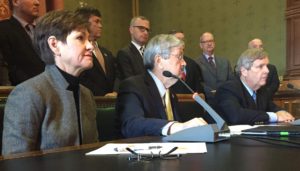Tax exemptions should be on the table
The urban and rural divide is alive and thriving. The response to an appearance this week by former Iowa governor and U.S. Ag Secretary Tom Vilsack at Gov. Terry Branstad’s news conference announcing a possible extension and expansion of a penny sales tax now funneled to school infrastructure proves it.
Branstad’s proposal is to extend a one-cent sales tax earmarked for school infrastructure and set to expire in 2029. The plan would keep the tax in place for 20 additional years, through 2049. While schools would continue to earn proceeds from that tax to a certain cap point, about three-quarters of future growth would be funneled to conservation efforts that help reduce farm chemical runoff and, in turn, improve Iowa’s water quality.
Some Iowa Democrats were quick to paint the proposal as the latest attempt by Branstad to shortchange Iowa’s public schools, and subsequently condemn Vilsack as “out of touch” for offering support to the proposal.
“I was actually hopeful — after last summer’s vetoes of spending for education — the governor had run out of ideas on how to undercut our local schools,” Senate Majority Leader Mike Gronstal said in his own follow-up news conference.

Last October Vilsack came to Iowa while announcing a $3 million USDA investment for protecting and restoring wetlands. The money was part of a $30 million commitment by the USDA across six states, and a sliver of the more than $2 billion investment by the Obama administration targeting conservation of Iowa’s land, water and air. During that visit, Vilsack lamented the lawsuit brought by Des Moines Water Works against three rural counties, calling once again for voluntary programs to address runoff and general cooperation in addressing ongoing issues.
It is a policy drum Vilsack has long carried, and the beat has only intensified in the wake of a lawsuit that could ripple not only across the state, but throughout the nation.
Speaking with me in advance of the National Rural Assembly last year, Vilsack said the water works lawsuit was “an opportunity.”
“I’ve been encouraging the governor, farm groups and those who are interested in finding a creative and innovative way to respond to the water works litigation,” he said. “I think there is an opportunity here for the state of Iowa in particular to create a leadership opportunity to bring people together instead of encouraging folks to be apart. I suggested to Gov. Branstad and others that we should have, for lack of a better example, a sort of Vision Iowa approach to water quality in the state.”
During the October visit, Vilsack suggested the state also could move forward on water quality efforts by raising sales tax to fund the Iowa Natural Resources Trust Fund, which Iowans overwhelmingly established in 2010.
Iowans should work together to find a solution, he says because that “would be better than having a guy in a black robe deciding it.”
So it is little wonder that Vilsack would stand in tacit support of a Branstad proposal — or other proposals — aimed at pulling the issue of water quality out of the courts. Bridging and circumventing the urban-rural divide has been a hallmark of his Cabinet career.
Finally, extension of the one-cent sales tax for infrastructure is a long-term priority of many K-12 officials around the state. “The needs aren’t going away, and we must continue to address them,” Cedar Rapids Superintendent Brad Buck told our editorial board this week. A suburban and rural superintendent also in that meeting nodded their agreement.
Support of Branstad’s proposal? They want more details first.
Implicit within such discussions is the political reality that the GOP-controlled Iowa House, which has already taken a hit for raising the gas tax and is feeling pressure to fund the Natural Resources Trust, may need an incentive to not let the extra penny sunset. As far as compromises go, this may be a best-case scenario for cash-strapped schools to continue to address a rapidly aging infrastructure and keep unpopular property tax hikes at bay.
Democratic lawmakers and education supporters who now find the proposal unsavory may decide some infrastructure dollars are better than none at all. But before they agree to such a deal, Iowa’s long and confusing list of sales tax exemptions should be revisited, especially those specifically carved out for agricultural interests.
Working together requires that everyone have some skin in the game.
This column by Lynda Waddington originally published in The Gazette on January 10, 2016. Photo credit: Erin Murphy/Lee Enterprises
